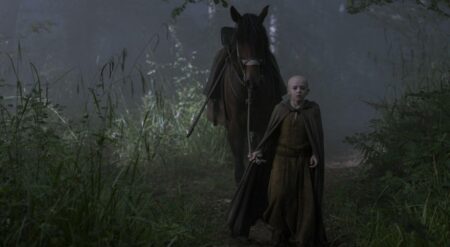Initially announced as a film, Prime Video and SEGA’s Like A Dragon: Yakuza adapts the first game (and its remake) in the beloved franchise almost 20 years after it began. Taking on a darker tone than the chaotically campy Yakuza games we know today, the series embraces the hallmarks of the yakuza film genre as it plunges audiences into the dark underworld of the yakuza while always keeping its focus on family in all of its facets.
Set in the fictional town of Kamurocho, the narrative is told through two intersecting timelines—1995 and 2005. Through both, we see cause and effect, with every choice never happening in a vacuum. In 1995, eager to escape their restrictive lives, Kazuma Kiryu (Ryoma Takeuchi), Nishikiyama Akira (Kento Kaku), Sawamura Yumi (Yumi Kawai), and Miho (Hinano Nakayama) plan a heist at a local arcade. Unbeknownst to them, the arcade they target is under the strict control of the Dojima Family, a powerful yakuza organization that rules Kamurocho. Their lives change forever when the heist forces them to enter the city’s yakuza-controlled underworld.
In 2005, we see the consequences. Kiryu is set to be released from prison for a slight against the Dojima family. He learns from Detective Date that his friends are in danger and returns to Kamurocho to protect them, only to have to adapt to a world that looks entirely different from the one he left. His friendship with Nishiki has deteriorated. Tensions have risen to a new high between the Tojo Clan and the Omi Alliance. Yumi is still desperately trying to save a sister who wants nothing to do with her.

The Like A Dragon: Yakuza live-action series is intriguing because it is dedicated to creating kinetic action sequences that pack impact without becoming bombastic chaos. This is most clear in the fights that showcase how Kiryu got his dragon back tattoo and became known as the Dragon of Dojima.
The fights are against distinctive characters in terms of visuals and style, but the series’ grounded approach to storytelling, even in its action, doesn’t fade away. This is best captured in the series finale’s final action sequences, which capture the strength of the yakuza genre of films and maintain the emotional weight of the relationships we have spent six episodes understanding.
This element, despite adhering to slight physical humor in execution, is not what the game franchise it’s based on is known for. However, for fans of yakuza films, this and other hallmarks, like the series finale, make the utmost sense. Fights and kills are all themed, but their darker edge grounds them in the larger genre of television and film. This allows Like A Dragon: Yakuza to not just be a game adaptation but rather a larger contribution to the genre that inspires it.
Your mileage on how much you appreciate these changes will rely on how much you believe the specific style of Japanese camp is necessary for the Like A Dragon story itself. There is humor here, but it is used to accent moments instead of becoming the takeaway. But the video game franchise on which this Prime Video series is based isn’t just about absurdity. It’s also about characters, their relationships, and their growth. On that note, Like A Dragon: Yakuza excels. The show’s darkness is never for strictly shock value nor overwhelms its story. Instead, that grit just creates a stable foundation.
Balancing larger politicking in the yakuza underworld against the need to keep character individuality among their clan or family allows the series to focus on developing identities through circumstance as much as showcasing the tension between yakuza life and attempting to live outside of it. Kyru, Nishiki, and Yumi are all characters that build layer upon layer across the season.

Told non-linearly, Like A Dragon: Yakuza allows character motivations and relationships to develop through flashbacks. While the narrative style of showing a choice made and returning to the past to outline it can be frustrating in other formats, the live-action series’ central mystery makes this choice work far better than I usually have an appreciation for. It sets the stage for the audience to understand the histories of our central characters, Yumi, Nishiki, and Kiryu, are long, with nothing isolated from the past in the present’s storyline.
As our core cast, Kiryu, Nishiki, and Yumi excel, their actors, Ryoma Takeuchi, Kento Kaku, and Yumi Kawai, respectively, showcase the characters’ changes over time. By taking place in both 1995 and 2005, the series presents a stark challenge for its actors, especially as it accelerates to its conclusion. Ten years makes each character into a new person. Grounded in central themes, of course, but the impact of life and loss on each of them, and the guilt they feel or anger that they justify deeply changes who we see at the end of it all.
Family, both in concept and reality, is the primary theme of Like A Dragon: Yakuza both in and out of the orphanage. Yumi is searching for her sister, Aiko. Kiryu and Nishikiyama are more brothers than best friends. The series engages the relationships of oyabun and underlings, orphans and their guardians, friends who are family, and blood siblings. But more importantly, every choice that gets the spotlight in the series is made salient by watching the ripples it causes, either as it forms rifts between the siblings on display or brings them together. Ultimately, not every betrayal is about the clan; it can be personal, too.

SEGA and Prime Video didn’t set out to make a one-for-one live-action series adaptation. Instead, they set out to make a good story. In that way, the series does what is most important in the adaptation space: justify its existence. Those words may seem harsh, but when such a long-running property finds life in new media, it’s important for that new avenue of storytelling to do two things: add more to the franchise and be accessible to those who have never engaged with the original property. Like A Dragon: Yakuza pulls this off.
That said, the easter eggs throughout the series are many, and I, for one, hope for many more seasons of the series, if not only for Munetaka Aoki‘s stellar visuals to bringing Goro Majima to life (who sadly doesn’t get anywhere nears as much screentime as he does in Takashi Miike‘s 2007 adaptation). While this series may be wildly different in tone from its source material and even the aforementioned Miike adaption, that is its strength.
Whether this live-action series is a sharp departure from the tone of the video game franchise or not, Like A Dragon: Yakuza is objectively fantastic television. The pacing, character development, action, and how the series embraces the tropes of the yakuza genre make Like A Dragon shine. With charismatic actors, fantastic costumes, and a lead with a heart of gold, you can’t help but fall in love with the series.
Like A Dragon: Yakuza (2024)
-
Rating - 9/109/10
TL;DR
Whether this live-action series is a sharp departure from the tone of the video game franchise or not, Like A Dragon: Yakuza is objectively fantastic television.







